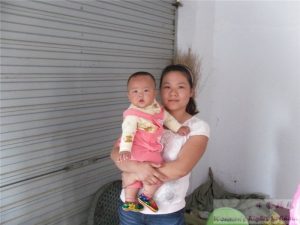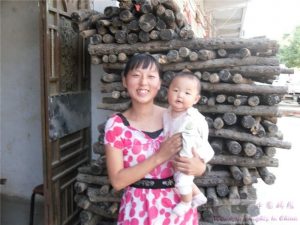Preliminary Report on the Rural Girls Assistance Program in Hubei Province
WRIC Xiao Wan July 05,2011
Xincheng Village of Suizhou City in Hubei is situated in remote mountainous terrain. It is three hours by bus from the Suizhou administrative center. It used to be the government seat of Wanhe Town. Recently the town government has moved to another place, but most intellectuals and officials from about thirty mile round still lived there. Culturally it is also more enlightened than the surrounding hill villages.
Shen Hongmei, who came from one of these villages, married Yu Banggui of Xincheng and gave birth to a baby girl named Yu Xinru. When the girl was six-month old, the chairperson of the Village Women’s League informed Hongmei that she could receive 100 yuan assistance until she turned one. After registration, she received the money along with other mothers of baby girls in the village. Shen thought the policy was very good, but did not know where it originated or where the money came from.

Shen Hongmei with her baby girl. (Photo by WRIC)
WRIC, an organization headquartered in the United States, was founded in 2007. It aims to develop assistance and educational programs for girls in Mainland China’s poor rural areas. For example, it provided aid to abandoned orphans raised by Buddhist nunneries and advocated for women who were victimized by the One Child Policy. The assistance of 100 yuan a month Wu Xinru received came from WRIC’s Rural Girls Assistance Program. The project was designed to combat gender discrimination in China, to fight for girl babies’ equal rights to survive, to give encouragement to mothers of girls, in order to strengthen the confidence of mother and daughter, to enable young girls to grow up in both mental and physical health.
Along with Suizhou mothers like Shen Hongmei, mothers from other Hubei municipalities and Anhui, Shanxi and Guizhou provinces also received assistance. The funding for the Rural Girls Assistance Program came from an American Christian eager to spread the love of God to Chinese women. Chinese volunteers travel over the hills and ridges to remote villages to look for women and girls in need of help.
Volunteers and the Village Women’s Chairperson
In this project, the role of the Village Women’s Chairwomen were very important. They knew the situation of each family. Volunteers could receive accurate and effective information from them. Qiu Hua, of Xinchen Village, Wanhe Town, gave birth to a girl on March 18th, 2010. The village women’s chairwoman told her of the monthly stipend when the baby reached six months. Afterwards, the chairwoman sent in her name and accompanied the WRIC volunteer on his rounds distributing assistance every month.

Geng Hua with her six month old daughter. (Photo by WRIC)
Moreover, WRIC volunteers often relied on guidance from these village chairwomen in their visits to families of baby girls. As evidenced by one video provided by volunteers, one such chairwoman led volunteers to a family in Taibai village. The village was situated at the foot of the high peak of Tongbo Mountains. The dirt road through the village was flanked by hedges of twigs and wild growth, often with clotheslines hanging in between. Beneficiaries of the Rural Girls Assistance Program were often scattered in such inconspicuous hamlets. To discover them required almost carpet-like coverage in our search.
The Rural Girls Assistance Program in progress looked for rural women who were five to nine months pregnant and mothers with girl babies under one year’s age and their families.
The Grand Parents who Refused to Hug Their Granddaughter
Li Linlin was a six-month old baby in Kuangshan Village, Suizhou, Hubei. Her mother Wu Mei’e had one sadness that never could go away. Linlin’s grandparents never wanted to hold or hug her. During a visit by volunteers, Wu couldn’t hold back the complaint againt the elder generation’s discriminatory ideas that robbed the girls of an important source of love.
Xincheng Village resident Yu Banggui had similar experiences. His father frowned when the girl was born. He had kept hurrying Yu and his wife Shen Hongmei to have a son.
According to the One Child Policy as practiced in most rural areas, families whose first born was a girl was usually allowed to have another birth. If the first child was a son, then further births were prohibited.
Gender imbalance in China is no longer news. According to officially released statistics, the gender ratio between newborn boys and girls is 119 to 100. In 2020, China will have 30 to 40 million men who would have no hope to marry. Chinese scholars gave even higher ratios than the government figure, at 121 to 100. The Baby Shower Project investigated rural areas of Hubei. In the areas we covered, the ratio could reach as high as 130 to 100.
Gender imbalance resulting from gender discrimination is not merely a problem of reproduction. It relates to almost every social problem of China in the future and the most basic rights of every member of society. 30 years of Birth Planning Policy the government implemented only exacerbated a problem inherent in traditional culture.
“Assistance for Girls Is Great!”
Although the birth of the girl didn’t please her father-in-law, Shen Hongmei was still happy. Not only did she receive the monthly assistance from The Rural Girls Assistance Project, envy and talk of fellow villagers gave her encouragement. “Give birth to a girl, get assistance. It’s great! Our neighbor who had a son were very jealous of us.” Said Shen.
Villagers were very curious of the project, whose origins were a mystery to them. Not only did the families of baby girls receive assistance, expectant mothers received help too. Many of them gave a thumbs up to such a “policy”. Taibai village resident He Feng said that The Rural Girls Assistance Project assistance was greatly satisfying and totally unexpected.
Shen Hongmei’s husband owned a vehicle repair shop. The family was relatively well off in the village. But since she gave birth to the girl, she had to face the in-laws who looked at her askance and a husband who tried to avoid a confrontation as much as possible, using excuses to stay in the shop all day. This situation however left Shen plenty of freedom. Every month as soon as she received the 100 yuan assistance she would buy powdered milk, diapers and other essentials. To her, the money represented more than materiel, it brought self-confidence and dignity. Pregnant women in the village who found they carried girls usually want an abortion. Shen said that it would never happen with her. “In my mind, if I am to have a second one, and if the second one is a girl, I would still have her. I don’t care what others say.”
The Rural Girls Assistance Project gave a one-time 100 yuan assistance to every expectant mother with 5 to 9 month pregnancies. What especially surprised villagers was that it encouraged mothers who gave birth to girls with monthly stipends of 100 yuan, contrary to popular prejudices favoring boys.
